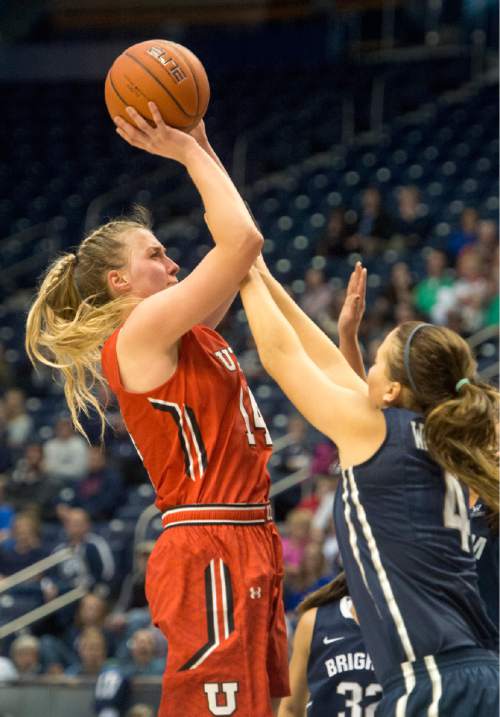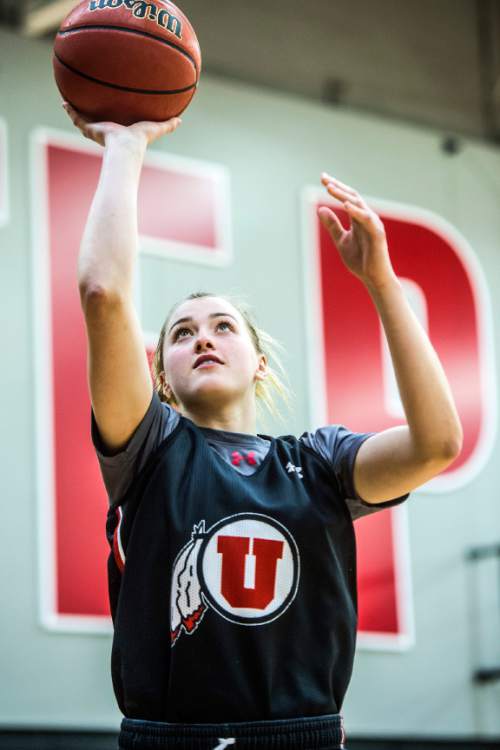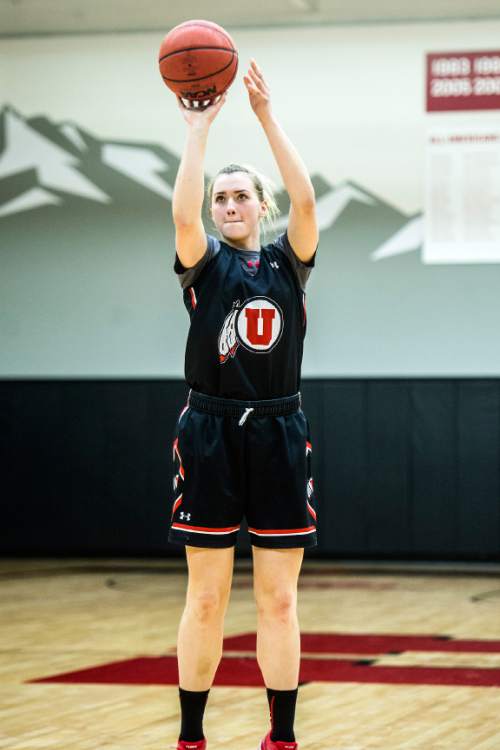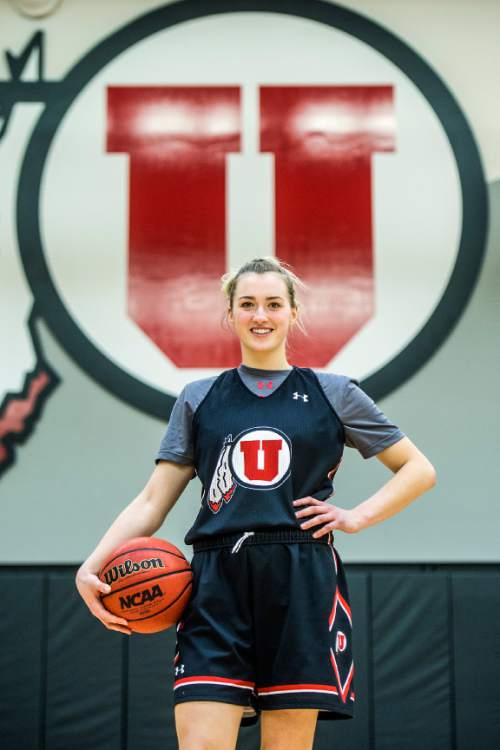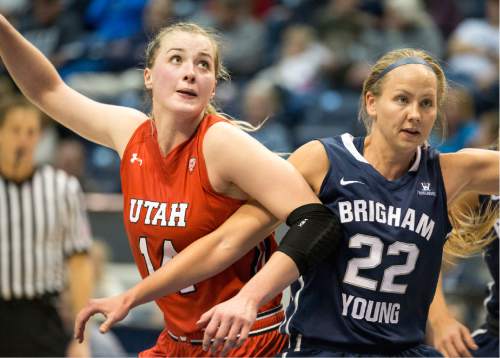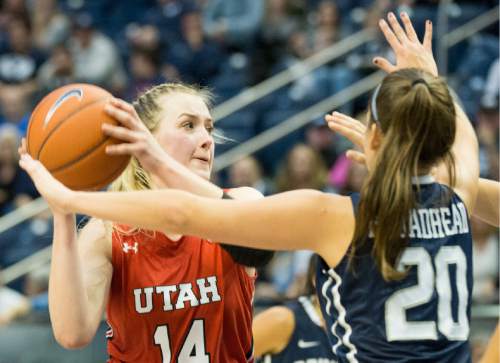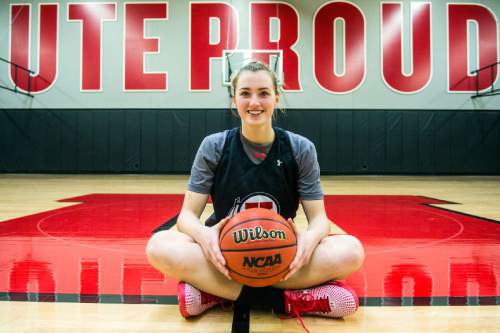This is an archived article that was published on sltrib.com in 2016, and information in the article may be outdated. It is provided only for personal research purposes and may not be reprinted.
Joining Utah women's basketball in 2012, Nakia Arquette knew this much about her freshman roommate: She was Canadian, and she played on the wings — the same position Arquette did.
Arquette saw what Paige Crozon could really do in their first practice: shoot, rebound, block, drive. Crozon did a little bit of everything, and she was good.
"I thought, 'Oh boy,' " Arquette said. " 'Four years of competing with this.' "
All that promise for Crozon, a 6-foot-1 forward, is now being realized. In the fourth season since her arrival, she's averaging 12.8 points and 8.4 rebounds per game for Utah (12-7, 4-4), emerging as one of the team's most versatile weapons.
Until this season, Crozon spent much of her career shrouded by a cloud inside her head.
For more than a year, Crozon was struck by debilitating migraines so painful that she struggled through class, social life and basketball. The most frustrating part was the mystery: she didn't understand why it was happening.
The fog has been lifted. And for maybe the first time as a Ute, Crozon is showing what she can do.
"The most rewarding thing for me is, given how unorthodox my career has been, that I can play free," she said. "I just always try to remember how lucky I am."
Crozon is easily identified with her long, golden locks tucked smartly into a ponytail and headband. When she sets her vision on the hoop, little prevents her from getting there. She also gets to the free-throw line, where she's one of the Pac-12's best shooters (83.1 percent).
Taking over the program this spring, Lynne Roberts said she knew Crozon was a good worker and a physical specimen who could shoot. When she started running full practices, what really stood out was Crozon's competitiveness: She's not easily flustered.
"She's absolutely fearless," Roberts said. "She could attack, get her shot blocked in the eighth row, and she'll still come back at you the next time. That's really special."
Crozon's determination on the court is part of her personality: She competed in basketball, volleyball, hockey, track and swimming through her grade school days, and the one thread through all of them, her parents Gary and Leanne Crozon recall, is that she always wanted to win. She often drove far from hometown of Humboldt in Saskatchewan — home to fewer than 6,000 people — to pursue her sports interests.
She ended playing for the Canadian National Team, the second-youngest player to ever play for the U19 squad. While she had an opportunity to go to college near parents, she elected to venture to Utah instead, joining the likes of fellow Canadians Michelle Plouffe and Taryn Wicijowski.
With 10 starts in her freshman year, she was progressing. But during a practice for Utah's WNIT run, Crozon collided with one of the men the Utes use for scout team work. She didn't think it was serious initially, but it set off a string of visits to hospitals, doctors and specialists that consumed an entire season.
Crozon describes the pain as a "nagging ringing in my head that made everything difficult." She found it challenging to read books, watch TV, or even reach back for a memory. She slept 10 to 11 hours a day with a heat pad strapped to her face.
Her parents and even some of her teammates say Crozon's upbeat attitude helped hide how much pain she was going through. But everyone knew it was hard for her to watch the game from the bench.
"She's such a happy-go-lucky person," Arquette said. "She always tries to push through pain, and she won't admit defeat. But I think it was super frustrating for her, and was super frustrating to watch someone with so much potential struggle like that."
Her salvation was almost an accident. She and then-coach Anthony Levrets had talked about ending her career with a medical hardship if her condition didn't improve — no one wanted her to play at risk of furthering her still mysterious injury. But a U. of U. doctor proposed a treatment: an injection of cortisone and lidocaine that might help.
The injection improved her condition almost immediately: Headaches were less severe, and the pain was less sharp. Doctors were able to diagnose that Crozon had suffered severe trauma to the nerves in her neck — they likened it to getting whiplash in a car wreck.
If they weren't sure just how much Crozon had been affected by her headaches, the people around her now saw just how different she was with treatment. She was lighter, more energetic, and just seemed like the person she had been before.
"We feel that she is finally getting back to her old self, playing with more confidence and enjoying herself," her parents wrote in an email. "We are very grateful to the past and present coaching staff and healthcare professionals for making sure she got the treatment she needed."
With injections and determination, Crozon was able to retake the court — remarkable considering that her neck injury was not her only challenge. She took an elbow to the face that tore meniscus in her jaw, and suffered an avulsion fracture in her foot that kept her out several weeks last season.
She lost 80 percent of her hearing in one ear after hitting her head in practice. Said Crozon, cheerfully: "They said it might come back, but it's been two years, so I'm not sure."
It would be impossible to know how many wounds Crozon has taken through basketball just by meeting her. Her sunny disposition covers all of her tough past — as does her will to compete.
"It's amazing, it speaks to her toughness," Roberts said. "If I had been through all of that, had don't know if I could attack the basket like she does, or fly in for rebounds like she does."
Crozon definitely isn't afraid to fly: She's led the team in scoring seven times, in rebounding five times and even notched three blocks in her last game against Oregon. In a loss to No. 10 Arizona State on the road, Crozon pitched in a valuable effort with 20 points and 16 rebounds — the most dominant of her eight double-doubles this year.
She still gets injections. She still has the occasional headache. But the pain isn't close to what it was. And like every opportunity she sees on the court, she'll take her silver linings and run with them.
"I was on the teeter-totter for a while on whether to hang up the laces or whether to push through," she said. "I'm so glad I kept going."
Twitter: @kylegoon —
About Paige Crozon
• Averaging 12.8 points, 8.4 rebounds per game for Utah in 19 games this season.
• Has scored in double figures in 10 of her past 12 games.
• Third in Pac-12 in FT percentage (83.1 percent); eighth in rebounding.
• Has set career game highs this season in points (24), rebounds (16) and 3-pointers made (four).
• Played for the Canadian National team for the U19 squad
• Native of Humboldt, Saskatchewan and an Emergency Medical Services Major.
USC at Utah
P At the Jon M. Huntsman Center
Tipoff • Friday, 7 p.m.
TV • Pac-12 Networks
Radio • 700 AM
Records • USC 15-5, 3-5; Utah 12-7, 4-4


